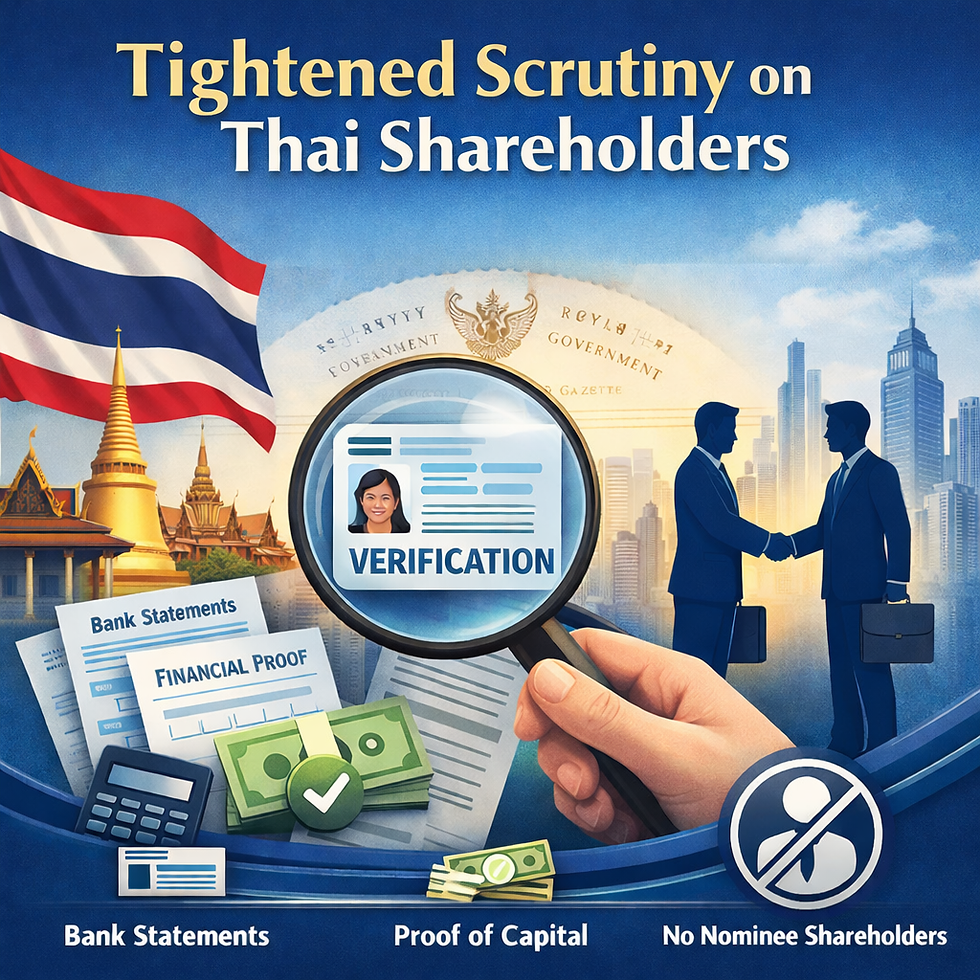How to Deal with Inheritance Without a Will in Thailand 在泰國如何處理沒有遺囑的財產
- 2023年1月29日
- 讀畢需時 3 分鐘
With the development of modern society, many people have the concept of drafting a will to distribute their property when they passed away. However, some people passed away suddenly without a will. In this situation, Thai Civil and Commercial Code (“CCC”) has relevant regulation regarding to this.
隨著當代社會發展,很多人會有立定遺囑的觀念。但是有些人會突然過世而來不及立遺囑,這種情況《泰國民商法》(簡稱”CCC”)有相關規定。
Based on CCC,[1] there are only six classes of statutory heir, and each class is entitled to inherit in the following order:
CCC規定有6類繼承人,且每類都有權按以下順序繼承:
1) descendants; 後代
2) parents; 父母
3) brothers and sisters (full blood); 親生的兄弟姊妹
4) brothers and sisters (half blood); 有一半血緣關係的兄弟姊妹
5) grandparents; 祖父母
6) uncles and aunties. 叔叔舅舅、姑姑阿姨
The surviving spouse is a statutory heir of the same class as the descendants.
生存的配偶與後代為同等級的法定繼承人。
In addition, if there is any heir surviving or represented in a class as specified in Section 1629 as the case may be, the heir of the lower class has no right at all to the estate of the deceased.
此外,如果依1629條規定在1類的繼承人中有生存者或代表,下階的繼承人完全無權繼承亡者的遺產。
However, the forgoing paragraph does not apply in the particular case where there is any descendant surviving or represented as the case may be, and also the parents or one of them are still surviving; in such case each parent is entitled to the same share as an heir in the degree of children.[2]
但是前段不適用於倖存後代/代表以及父母或其一仍在世的特殊情況。這種情況下父母有權與子女的繼承人均分。
As to the division of shares, Section 1633 of CCC indicates that the statutory heirs of the same class in any of the classes as specified in Section 1629 are entitled to equal shares. If there is only one statutory heir in such class, he is entitled to the whole portion.
至於財產分配,CCC第1633條規定第1629條指定的任1類中,同一類的法定繼承人均分。如果該類只有一位法定繼承人則有權享有全部。
Furthermore, if the owner of a property died outside of Thailand and the property is divided in accordance to foreign court judgment, it is not recognized in Thailand. The heir must file a new case in Thailand and use such foreign judgment as an evidence in the court to obtain the court’s approval.
此外,如果財產持有者非泰國死亡、且財產依據國外法院裁定,此裁定不被泰國接受。繼承人需在泰國提起訴訟並將國外法院的裁定作為證據得到泰國法院的認可。
Please also note that there is 5% of inheritance tax if the recipient is an ascendant of descendant of the decedent.
需要注意如繼承人為繼承人的後代,會適用於5%的遺產稅稅率。
#泰國遺產 #泰國遺產分配 #泰國遺囑 #泰國法定繼承人 #泰國民商法 #IBC法律金融會計事務所 #泰國事務所 #泰國律師 #泰國法律事務所 #泰國中文律師 #泰國會計 #泰國會計事務所 #泰國審計 #IBCFirm #Thailaw #Thailawfirm #ThaiAccountingFirm #ThaiAuditFirm #inheritanceinthailand #inheritancedivisioninthailand #testamentinthailand #civilandcommercialcode #statutoryheirofinheritanceinthailand #inheritancedivision




留言